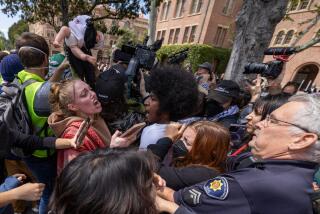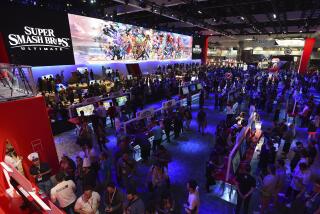What if They Threw an Expo and the U.S. Didn’t Come?
- Share via
BERLIN — When Germany proudly hosts its first world’s fair a mere six weeks from now, the most powerful country on the planet will only virtually be there.
For lack of commercial sponsors, the United States has pulled out of the Expo 2000 extravaganza in Hanover, where more than 180 countries and organizations will display their triumphs and ingenuity under the banner “Humankind--Nature--Technology.” It will be the first time in the fair’s 149-year history that the U.S. will not be among those strutting their achievements.
The home country of Microsoft, Cisco Systems and Sun Microsystems had reserved the biggest and most prominent site at the vast fairgrounds three years ago, but the brightest lights of high technology and environmental science pulled their purse strings shut when U.S. government boosters passed the hat for the American portion of the $1.65-billion bash.
The no-show is necessitated by U.S. regulations prohibiting expenditure of public money on promotional projects--a legislative reaction to the costly and embarrassing flop of a U.S. display at Expo ’92 in Seville, Spain. Only corporate sponsorship and some bent rules allowed a U.S. presence at the last few biennial fairs, the latest in Lisbon in 1998.
“Despite considerable effort to attract private-sector financial support, the U.S. will not be able to have a U.S. national pavilion at Expo 2000,” William Rollnick, the U.S. commissioner for the Expo, told the German public through the U.S. Embassy here.
Instead of the planned $35-million rendition of Main Street USA, which was to take visitors on a walk through three centuries of life in the New World, the U.S. government will create a special Web site offering the same time-tunnel presentation, Rollnick said.
Washington also plans to focus cultural programs on Germany during the 153-day run of the Hanover event to ensure appearances by famous American artists, writers and intellectuals in Berlin and elsewhere.
Expo 2000 visitors shouldn’t sell short the value of the modified U.S. involvement, State Department spokesman James P. Rubin said in Washington.
“The Internet is a pretty important contribution to knowledge and information and communication, and I hope nobody will downplay the significance of a Web site,” he said after Wednesday’s announcement of the U.S. pullout.
Without the planned pavilion to display U.S. technological prowess, American know-how will now be represented by a more low-brow national success: the hamburger.
McDonald’s earlier secured a major catering franchise for the summer spectacle, which is expected to draw 250,000 to 300,000 people daily.
German leaders have reacted to the pullout of their allies across the Atlantic with diplomatic expressions of regret and stiff-upper-lip assurances that the show will go on.
“This is obviously a loss,” German President Johannes Rau told journalists as he toured the bustling fairgrounds being readied for as many as 40 million visitors from June through October. “It’s a pity that the Expo, without America, will not be as complete as we had wished.”
“This certainly leaves a hole in the event that we would like to have seen filled, but we don’t believe it will have any direct influence on the number of visitors,” said Expo 2000 spokeswoman Maren Brandt.
Some media and political pundits launched into a blame game, accusing Expo 2000 general manager Birgit Breuel of failing to read earlier signals that the U.S. project was not getting off the ground.
Disappointment and even anger were apparent in the reactions of others.
“One can twist it and turn it as one wants, but in the end, the refusal of U.S. participation is also ‘a political statement,’ ” fumed an editorial in the Neue Osnabruecker Zeitung, an influential newspaper in host state Lower Saxony. “The wealthy United States could have more easily afforded to stage its presentation of the American way of life than the numerous small and economically weak states that are managing to do something.”
Hanover’s miffed mayor, Herbert Schmalstieg, put it more bluntly: “Whoever doesn’t want to come can just stay home.”
More to Read
Sign up for Essential California
The most important California stories and recommendations in your inbox every morning.
You may occasionally receive promotional content from the Los Angeles Times.














